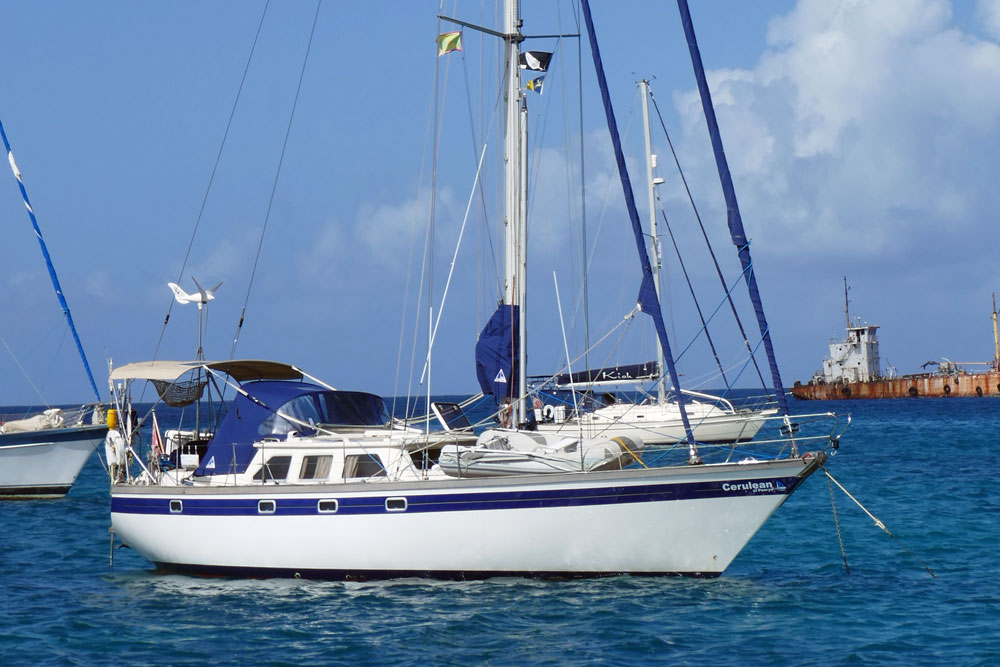- Home
- Cruising Yachts 40' to 45'
- Seastream 43
The Seastream 43 Sailboat
Specs & Key Performance Indicators
The Seastream 43, a heavy displacement pilothouse cutter, was designed by Ian Anderson and built in the UK by Seastream Yachts Ltd.
 A Seastream 43
A Seastream 43Published Specification for the Seastream 43
Underwater Profile: Fin keel & skeg-hung rudder
Hull Material: GRP (Fibreglass)
Length Overall: 43'8" (13.3m)
Waterline Length: 35'5" (10.8m)
Beam: 14'2" (4.3m)
Draft: 6'3" (1.9m)
Rig Type: Cutter
Displacement: 31,526lb (14,300kg)
Designer: Ian Anderson
Builder: Seastream Yachts Ltd (UK)
Year First Built: 1981
Number Built: 35
Published Design Ratios for the Seastream 43
1. Sail Area/Displacement Ratio: Not published
- Less than 16 would be considered under-powered;
- 16 to 20 would indicate reasonably good performance;
- Over 20 suggests relatively high performance.
2. Ballast/Displacement Ratio: 35.7
3. Displacement/Length Ratio: 316
- Under 100: Ultralight
- 100 to 200: Light
- 200 to 275: Moderate
- 275 to 350: Heavy
- Over 350: Ultraheavy
4. Comfort Ratio: 37.9
- Under 20 indicates a lightweight racing boat
- 20 to 30 indicates a coastal cruiser
- 30 to 40 indicates a moderate offshore cruising boat
- 40 to 50 indicates a heavy offshore boat
- Over 50 indicates an extremely heavy offshore boat
5. Capsize Screening Formula: 1.8
- Under 2.0 (the lower the better): Better suited for ocean passages
- Over 2.0: Less suited for ocean passages
Summary Analysis of the Design Ratios for the Seastream 43
1. In the absence of a published Sail Area/Displacement Ratio we are unable to make a performance assessment for the Seastream 43.
2. A Ballast/Displacement Ratio of 35.7 means that a sailboat like the Seastream 43 (which doesn't have a stiffness-enhancing bulb keel), is likely to benefit from being reefed early to keep her sailing upright in a moderate breeze.
3. A Displacement/Length Ratio of 316, tells us the Seastream 43 is clearly a heavy displacement cruising boat. You can load her down with all your cruising gear and equipment and it will hardly affect her waterline. Not an ideal choice for coastal sailing, but she'll come into her own on an offshore passage in testing conditions.
4. Ted Brewer's Comfort Ratio of 37.9 suggests that crew comfort of a Seastream 43 in a seaway is similar to what you would associate with the motion of a moderate bluewater cruising boat - a predictable and acceptable motion for most seasoned sailors.
5. The Capsize Screening Formula (CSF) of 1.8 indicates that a Seastream 43 would be a safer choice of sailboat for an ocean passage than one with a CSF of more than 2.0.
The Seastream 43: A Sailboat for All Seasons
The Seastream 43 is a boat that has stood the test of time and has earned a reputation as a solid and reliable bluewater cruiser. Many Seastream 43 owners have sailed around the world or across oceans with this boat, and they have nothing but praise for its performance and seaworthiness.
Accommodation
One of the most attractive aspects of the Seastream 43 is its spacious and comfortable accommodation. The boat has three separate cabins, two heads, a large saloon, a galley, and a navigation station. It can sleep up to eight people, making it ideal for family cruising or entertaining guests.
The forward cabin has a V-berth with an infill cushion, a hanging locker, and storage drawers. It also has its own ensuite head with a marine toilet, a sink, and a shower.
The aft cabin has a double berth, a hanging locker, and storage shelves. It shares the second head with the saloon, which also has a marine toilet, a sink, and a shower.
The third cabin is located on the starboard side of the saloon. It has two single bunk beds, a hanging locker, and storage drawers. It can be used as a guest cabin or as a workshop or storage room.
The saloon is the heart of the boat. It has a U-shaped settee on the port side that can convert into a double berth. It also has a large folding table that can seat up to six people. On the starboard side, another settee can serve as a single berth. The saloon has plenty of natural light and ventilation from the large windows and hatches.
The galley is located on the port side of the pilothouse. It has a three-burner gas stove with an oven and grill, a double stainless steel sink with hot and cold water, a top-loading refrigerator, and ample storage space for pots, pans, dishes, and food.
The navigation station is located on the starboard side of the pilothouse. It has a large chart table with drawers and shelves, an instrument panel with VHF radio, GPS, radar, autopilot, wind speed and direction indicator, depth sounder, log, and compass. It also has a comfortable seat with a backrest and a footrest.
The pilothouse is one of the best features of the Seastream 43. It offers excellent visibility from the helm station, which has a large wheel steering system with hydraulic autopilot. It also has engine controls, bow thruster controls, windlass controls, and engine instruments. The pilothouse has two sliding doors that give access to the side decks and the cockpit.
The cockpit is located aft of the pilothouse. It is protected by a sprayhood and a bimini top. It has two long benches with cushions and lockers underneath. It also has an aft lazarette that can store fenders, lines, gas bottles, and other gear.
Rigging and Sails
The Seastream 43 has a cutter rig with a deck-stepped mast and stainless steel standing rigging. The mast has two sets of spreaders and supports three sails: a mainsail, a genoa, and a staysail.
The mainsail is slab reefed with three reefing points. It is controlled by two winches on the mast and two winches on the cockpit coaming. The mainsail also has lazy jacks and a stack pack for easy handling.
The genoa is roller furling with a UV protection strip. It is controlled by two winches on the cockpit coaming. The genoa also has sheets that run through blocks on tracks on the side decks.
The staysail is hanked onto the inner forestay. It is controlled by two winches on the cockpit coaming. The staysail also has sheets that run through blocks on the coachroof.
The Seastream 43 also has a spinnaker pole that can be used to fly a spinnaker or a cruising chute. The spinnaker pole is stored on the mast and can be deployed with a topping lift and a downhaul.
Performance and Handling
The Seastream 43 is a heavy displacement sailboat that weighs 31,526 lb (14,300 kg). It has a fin keel with a skeg-hung rudder, giving it good directional stability and maneuverability. It also has a bow thruster that helps with docking and tight situations.
The Seastream 43 is not a fast boat but a steady and comfortable one. It can sail well in light to moderate winds, but it may need some help from the engine in very light airs. It can also handle strong winds and rough seas, as long as it is reefed early and balanced properly.
The Seastream 43 has a comfortable motion at sea, thanks to its heavy displacement and long waterline. It does not hobby-horse or slam into waves, but rather glides smoothly through them. It also has a low center of gravity and a high ballast ratio, which makes it stiff and stable.
The Seastream 43 is intended for offshore and ocean sailing, as it has the strength, the equipment, and storage capacity to cope with long passages. It also has a large fuel tank of 125 gallons (473 liters) and a large water tank of 210 gallons (795 liters), which gives it a good range and autonomy.
Fors and Againsts
The Seastream 43 is a sailboat that has many advantages and few disadvantages. Here are some of the main ones:
Fors:
- Spacious and comfortable accommodation for up to eight people;
- Well-equipped pilothouse with excellent visibility and protection;
- Solid and reliable construction and rigging;
- Good performance and handling in various wind and sea conditions;
- Suitable for offshore and ocean sailing.
Againsts:
- Heavy displacement and low sail area may limit speed and agility;
- Deck-stepped mast may be less strong than keel-stepped mast;
- The aft cockpit may be less spacious than a center cockpit;
- Limited availability and high price on the second-hand market.
Recent Articles
-
Beneteau Oceanis 473 Review: Specs, Performance & Cruising Guide
Feb 20, 26 04:49 AM
An in-depth review of the Beneteau Oceanis 473. Discover technical specifications, design ratios, and why this Groupe Finot design remains a top offshore cruising choice. -
Luders 36 Review: Specs, Performance Ratios & Cruising Guide
Feb 17, 26 06:20 PM
An in-depth expert review of the Luders 36 sailboat. Explore technical specifications, design ratios, and the offshore cruising capabilities of this classic Bill Luders design. -
Deck-stepped vs. Keel-stepped mast: An Offshore Engineering Guide
Feb 16, 26 07:59 AM
Comparing deck-stepped vs. keel-stepped mast systems. We analyze the propped cantilever effect, structural loads, and maintenance for offshore sailors.
